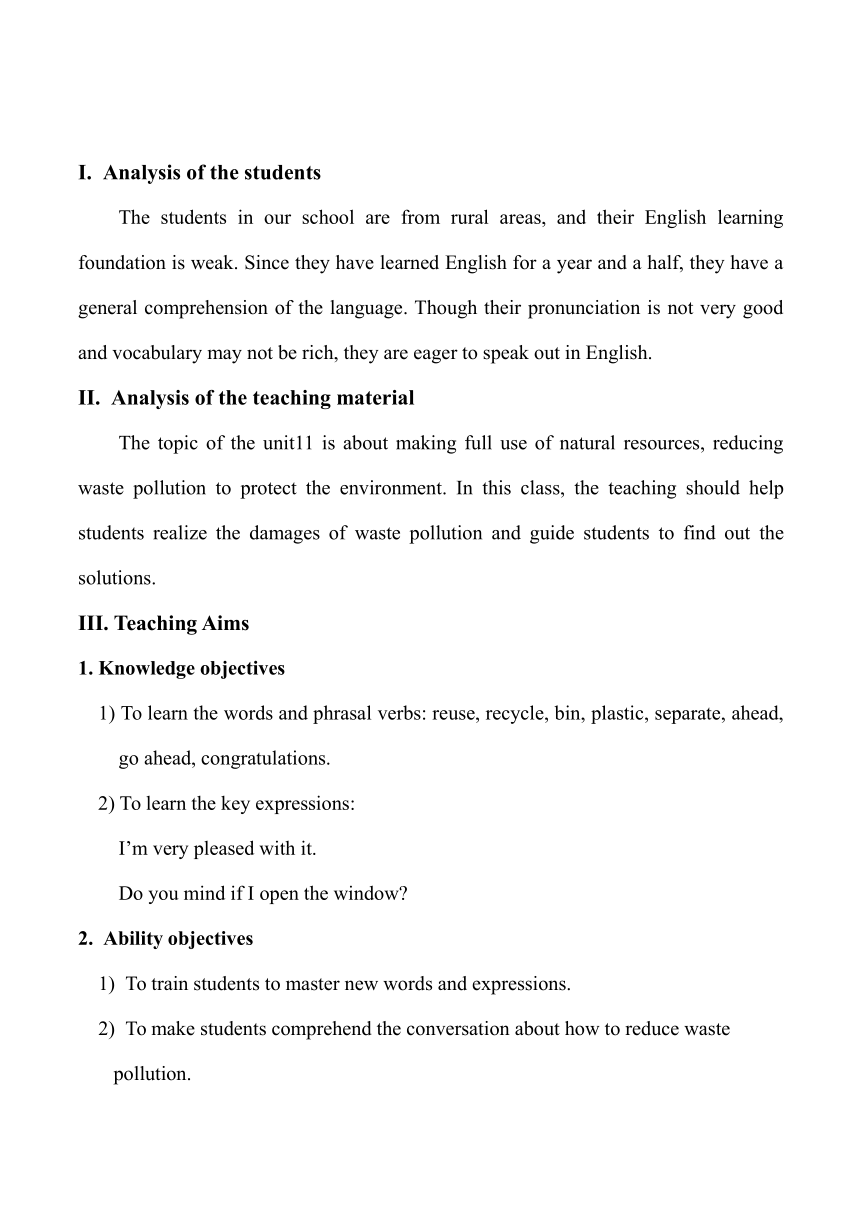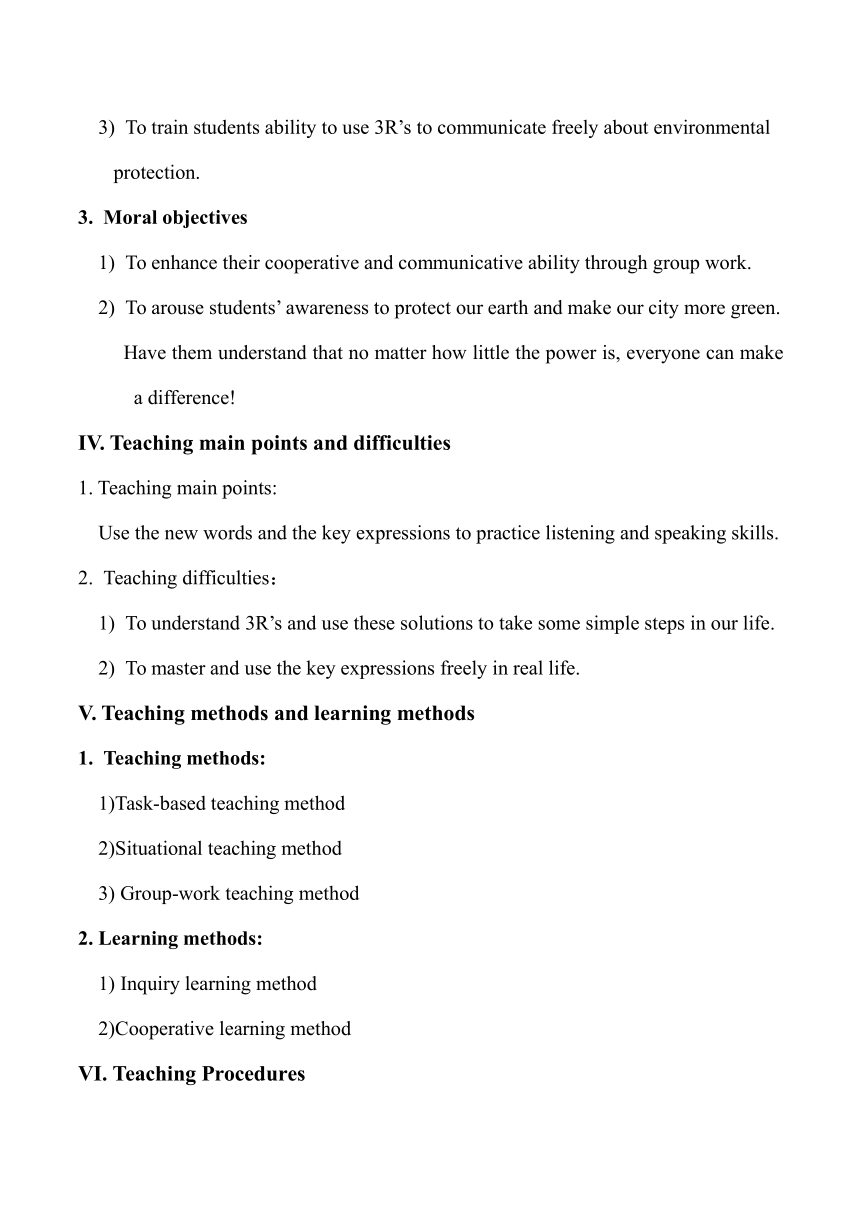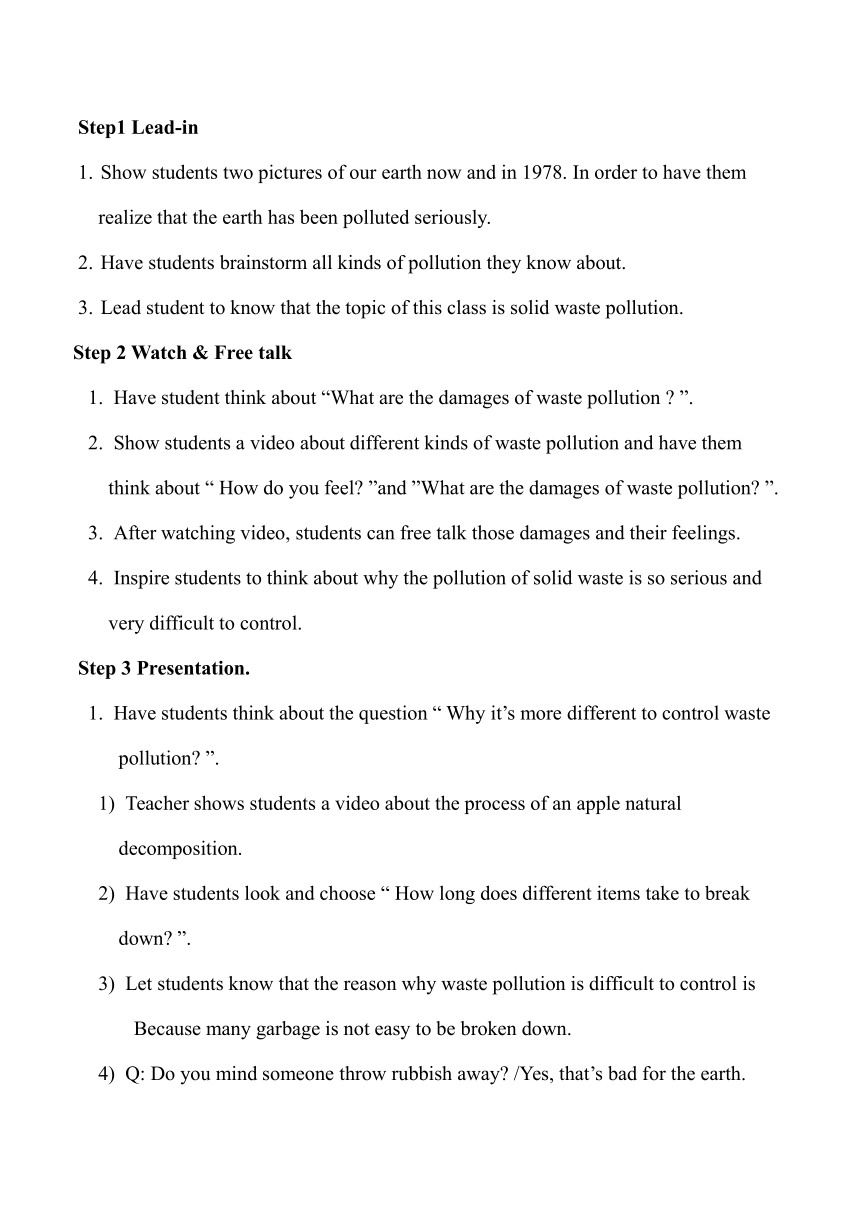外研版九上:Module 12 unit1 If everyone starts to do something, the world will be saved.教案
文档属性
| 名称 | 外研版九上:Module 12 unit1 If everyone starts to do something, the world will be saved.教案 |

|
|
| 格式 | doc | ||
| 文件大小 | 1.0MB | ||
| 资源类型 | 教案 | ||
| 版本资源 | 外研版 | ||
| 科目 | 英语 | ||
| 更新时间 | 2020-09-29 15:35:43 | ||
图片预览



文档简介
Analysis of the students
The students in our school are from rural areas, and their English learning foundation is weak. Since they have learned English for a year and a half, they have a general comprehension of the language. Though their pronunciation is not very good and vocabulary may not be rich, they are eager to speak out in English.
Analysis of the teaching material
The topic of the unit11 is about making full use of natural resources, reducing waste pollution to protect the environment. In this class, the teaching should help students realize the damages of waste pollution and guide students to find out the solutions.
III. Teaching Aims
1. Knowledge objectives
1) To learn the words and phrasal verbs: reuse, recycle, bin, plastic, separate, ahead, go ahead, congratulations.
2) To learn the key expressions:
I抦 very pleased with it.
Do you mind if I open the window?
Ability objectives
To train students to master new words and expressions.
To make students comprehend the conversation about how to reduce waste
pollution.
To train students ability to use 3R抯 to communicate freely about environmental
protection.
Moral objectives
To enhance their cooperative and communicative ability through group work.
To arouse students awareness to protect our earth and make our city more green.
Have them understand that no matter how little the power is, everyone can make a difference!
IV. Teaching main points and difficulties
1. Teaching main points:
Use the new words and the key expressions to practice listening and speaking skills.
Teaching difficulties:
To understand 3R’s and use these solutions to take some simple steps in our life.
To master and use the key expressions freely in real life.
V. Teaching methods and learning methods
Teaching methods:
1)Task-based teaching method
2)Situational teaching method
3) Group-work teaching method
2. Learning methods:
1) Inquiry learning method
2)Cooperative learning method
VI. Teaching Procedures
Step1 Lead-in
Show students two pictures of our earth now and in 1978. In order to have them
realize that the earth has been polluted seriously.
Have students brainstorm all kinds of pollution they know about.
Lead student to know that the topic of this class is solid waste pollution.
Step 2 Watch & Free talk
Have student think about 揥hat are the damages of waste pollution ? .
Show students a video about different kinds of waste pollution and have them
think about How do you feel? 攁nd 擶hat are the damages of waste pollution? .
After watching video, students can free talk those damages and their feelings.
Inspire students to think about why the pollution of solid waste is so serious and
very difficult to control.
Step 3 Presentation.
Have students think about the question Why it抯 more different to control waste
pollution? .
Teacher shows students a video about the process of an apple natural
decomposition.
Have students look and choose How long does different items take to break
down? .
Let students know that the reason why waste pollution is difficult to control is
Because many garbage is not easy to be broken down.
Q: Do you mind someone throw rubbish away? /Yes, that抯 bad for the earth.
I抦 very angry/disgusted with it. (由情境引出目标句型)
Have students learn the SR’s.
Ask student “What should we do to reduce the waste pollution? ”.
Have students check the thing that you should do to protect our environment .
( 把目标单词、短语、句式融入具体的语境中去学,做到词不离句。)
Have Ss add more to the list.
( 让学生去说出更多的关于减少垃圾, 保护环境的方式,从而达到发散学生的思维,让语言学习从大量输入到自然输出的教学目的。)
Step 4 Listening practice
Pre-listening
Liuchang and Amy are doing a survey about how do people usually deal with their old books, magazines and so on. Let students speak out what their own ways to deal with those used things.
While listening
Listen to the dialogue and choose the paper that Liuchang will take home..
Listen again and check these sentences true or false.
Post-listening
Listen for the third time to have student to fill in the blanks and focus on the key
expressions.
Do some exercise to consolidate the key expressions.
Step 5 Speaking
We know Liuchang and Amy are discussing how to deal with the old things in their
house.
Let students practice reading the dialog with their partners.
Have several pairs to show the dialog correctly, loudly and emotionally.
Let students use these pictures of some used things to make their own dialogues in
pairs with the key expressions.
Have some pairs to show their conversations in class.
Step 6 Group work
Get students to work in groups and make a plan about how to make our city more
green.
Give students some advice about how to change the used things into an art work.
Encourage students to complete this task through cooperation.
Have some groups to make a report about their handwork and plan.
Step 7 Summary
We cannot hope for rapid change, but let's do some simple things today to make our dream come true. 揕ucid waters and lush mountains are invaluable assets.
Step 8 Homework
Review the lesson.
Have students make a separate recycling area at home.
Blackboard Design
Unit11 Reduce, Reuse, Recycle
Unit11 Reduce, Reuse, Recycle recycle reuse
plastic bin separate
Do you mind if I open the window ?
I抦 very satisfied/ angry with ...
The students in our school are from rural areas, and their English learning foundation is weak. Since they have learned English for a year and a half, they have a general comprehension of the language. Though their pronunciation is not very good and vocabulary may not be rich, they are eager to speak out in English.
Analysis of the teaching material
The topic of the unit11 is about making full use of natural resources, reducing waste pollution to protect the environment. In this class, the teaching should help students realize the damages of waste pollution and guide students to find out the solutions.
III. Teaching Aims
1. Knowledge objectives
1) To learn the words and phrasal verbs: reuse, recycle, bin, plastic, separate, ahead, go ahead, congratulations.
2) To learn the key expressions:
I抦 very pleased with it.
Do you mind if I open the window?
Ability objectives
To train students to master new words and expressions.
To make students comprehend the conversation about how to reduce waste
pollution.
To train students ability to use 3R抯 to communicate freely about environmental
protection.
Moral objectives
To enhance their cooperative and communicative ability through group work.
To arouse students awareness to protect our earth and make our city more green.
Have them understand that no matter how little the power is, everyone can make a difference!
IV. Teaching main points and difficulties
1. Teaching main points:
Use the new words and the key expressions to practice listening and speaking skills.
Teaching difficulties:
To understand 3R’s and use these solutions to take some simple steps in our life.
To master and use the key expressions freely in real life.
V. Teaching methods and learning methods
Teaching methods:
1)Task-based teaching method
2)Situational teaching method
3) Group-work teaching method
2. Learning methods:
1) Inquiry learning method
2)Cooperative learning method
VI. Teaching Procedures
Step1 Lead-in
Show students two pictures of our earth now and in 1978. In order to have them
realize that the earth has been polluted seriously.
Have students brainstorm all kinds of pollution they know about.
Lead student to know that the topic of this class is solid waste pollution.
Step 2 Watch & Free talk
Have student think about 揥hat are the damages of waste pollution ? .
Show students a video about different kinds of waste pollution and have them
think about How do you feel? 攁nd 擶hat are the damages of waste pollution? .
After watching video, students can free talk those damages and their feelings.
Inspire students to think about why the pollution of solid waste is so serious and
very difficult to control.
Step 3 Presentation.
Have students think about the question Why it抯 more different to control waste
pollution? .
Teacher shows students a video about the process of an apple natural
decomposition.
Have students look and choose How long does different items take to break
down? .
Let students know that the reason why waste pollution is difficult to control is
Because many garbage is not easy to be broken down.
Q: Do you mind someone throw rubbish away? /Yes, that抯 bad for the earth.
I抦 very angry/disgusted with it. (由情境引出目标句型)
Have students learn the SR’s.
Ask student “What should we do to reduce the waste pollution? ”.
Have students check the thing that you should do to protect our environment .
( 把目标单词、短语、句式融入具体的语境中去学,做到词不离句。)
Have Ss add more to the list.
( 让学生去说出更多的关于减少垃圾, 保护环境的方式,从而达到发散学生的思维,让语言学习从大量输入到自然输出的教学目的。)
Step 4 Listening practice
Pre-listening
Liuchang and Amy are doing a survey about how do people usually deal with their old books, magazines and so on. Let students speak out what their own ways to deal with those used things.
While listening
Listen to the dialogue and choose the paper that Liuchang will take home..
Listen again and check these sentences true or false.
Post-listening
Listen for the third time to have student to fill in the blanks and focus on the key
expressions.
Do some exercise to consolidate the key expressions.
Step 5 Speaking
We know Liuchang and Amy are discussing how to deal with the old things in their
house.
Let students practice reading the dialog with their partners.
Have several pairs to show the dialog correctly, loudly and emotionally.
Let students use these pictures of some used things to make their own dialogues in
pairs with the key expressions.
Have some pairs to show their conversations in class.
Step 6 Group work
Get students to work in groups and make a plan about how to make our city more
green.
Give students some advice about how to change the used things into an art work.
Encourage students to complete this task through cooperation.
Have some groups to make a report about their handwork and plan.
Step 7 Summary
We cannot hope for rapid change, but let's do some simple things today to make our dream come true. 揕ucid waters and lush mountains are invaluable assets.
Step 8 Homework
Review the lesson.
Have students make a separate recycling area at home.
Blackboard Design
Unit11 Reduce, Reuse, Recycle
Unit11 Reduce, Reuse, Recycle recycle reuse
plastic bin separate
Do you mind if I open the window ?
I抦 very satisfied/ angry with ...
同课章节目录
- Module 1 Wonders of the world
- Unit 1 It's more than 2,000 years old.
- Unit 2 The Grand Canyon was not just big.
- Unit 3 Language in use
- Module 2 Public holidays
- Unit 1 My family always go somewhere interesting a
- Unit 2 We have celebrated the festival since the f
- Unit 3 Language in use
- Module 3 Heroes
- Unit 1 She trained hard,so she became a great play
- Unit 2There were few doctors, so he had to work ve
- Unit 3 Language in use
- Module 4 Home alone
- Unit 1 I can look after myself, although it won’t
- Unit 2 I became so bored with their orders that I
- Unit 3 Language in use
- Module 5 Museums
- Unit 1 Don't cross that rope!
- Unit 2 If you ever go to London, make sure you vis
- Unit 3 Language in use
- Module 6 Problems
- Unit 1 If I start after dinner, I'll finish it be
- Unit 2 If you tell him the truth now, you will sho
- Unit 3 Language in use
- Revision Module A
- Module 7 Great books
- Unit 1 We're still influenced by Confucius's idea
- Unit 2 It is still read and loved.
- Unit 3 Language in use
- Module 8 Sports life
- Unit 1 Daming wasn't chosen for the team last time
- Unit 2 He was invited to competitions around the w
- Unit 3 Language in use
- Module 9 Great inventions
- Unit 1 Will computers be used more than books in t
- Unit 2 Will books be replaced by the Internet?
- Unit 3 Language in use
- Module 10 Australia
- Unit 1 I have some photos that I took in Australia
- Unit 2 The game that they like most is Australian
- Unit 3 Language in use
- Module 11 Photos
- Unit 1 He's the boy who won the photo competition
- Unit 2 The photo which we liked best was taken by
- Unit 3 Language in use
- Module 12 Save our world
- Unit 1 If everyone starts to do something, the wor
- Unit 2 Repeat these three words daily: reduce, reu
- Unit 3 Language in use
- Revision Module B
